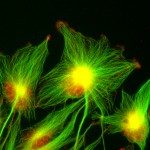Lien vers Pubmed [PMID] – 31756576
Curr. Opin. Cell Biol. 2019 Nov;62:114-122
Collective cell migration does not only reflect the migration of cells at a similar speed and in the same direction, it also implies the emergence of new properties observed at the level of the cell group. This collective behavior relies on interactions between the cells and the establishment of a hierarchy amongst cells with leaders driving the group of followers. Here, we make the parallel between the front-to-rear polarity axis in single cell and the front-to-rear multicellular-scale polarity of a migrating collective which established through exchange of biochemical and mechanical information from the front to the rear and vice versa. Such multicellular-scale polarity gives the migrating group the possibility to better sense and adapt to energy, biochemical and mechanical constraints and facilitates migration over long distances in complex and changing environments.


